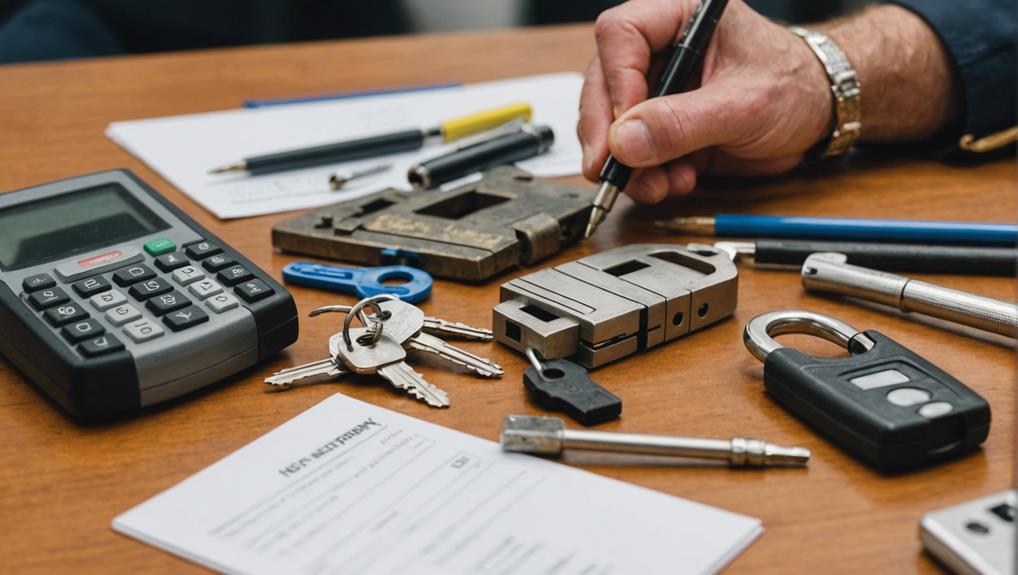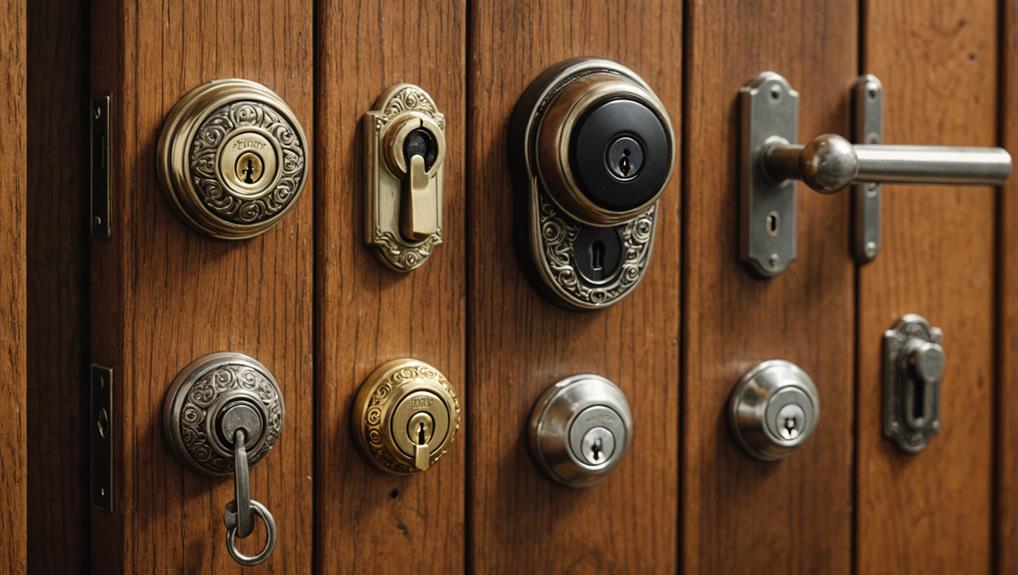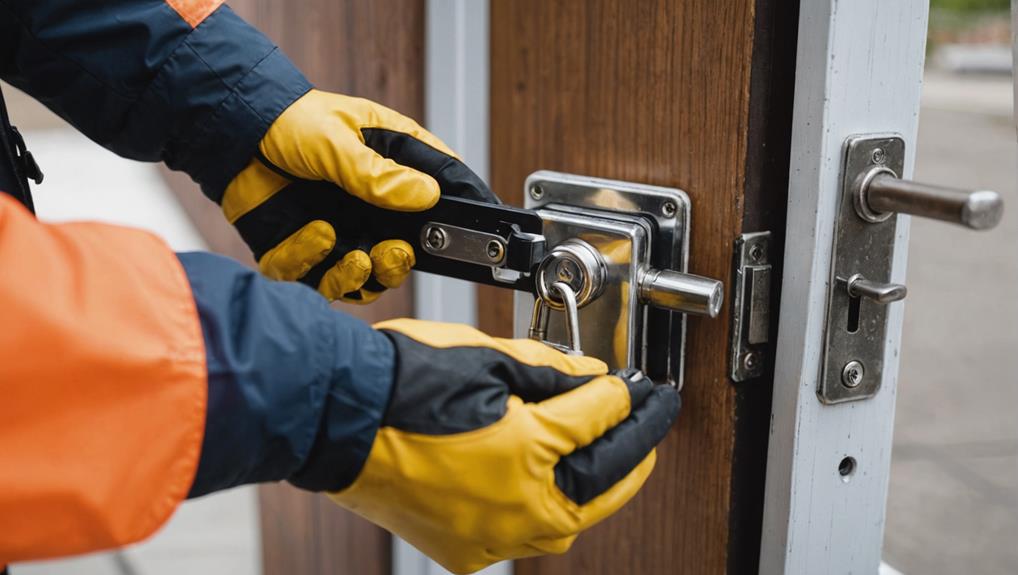As a landlord, you need to prioritize secure locks in your rental properties to protect your tenants and comply with local laws. Check the condition of existing locks regularly and replace those showing wear or malfunction. Consider high-security options like deadbolts or modern smart locks for better safety. Always rekey or replace locks between tenants to mitigate security risks. Keep detailed documentation of any changes, including dates and reasons, to safeguard against disputes. By addressing these areas, you'll enhance tenant satisfaction and safety, and there's more you can explore to streamline the process effectively.
Key Takeaways
- Ensure all entry points have functional, key-operated locks to comply with legal requirements and enhance tenant security.
- Promptly address tenant requests for lock changes to avoid potential legal issues and maintain trust.
- Regularly assess the condition of existing locks and replace those showing signs of wear or failure.
- Document all lock replacements, including dates and reasons, to maintain accountability and support compliance with local laws.
- Consider upgrading to high-security options like deadbolts or smart locks for improved tenant safety and peace of mind.
Understanding Legal Requirements
When it comes to lock replacement for rental properties, understanding the legal requirements is fundamental. As a landlord, you've got a responsibility to guarantee your tenants feel safe and secure in their homes. This includes being aware of your landlord lock responsibility, which may vary based on local laws and regulations.
In many areas, landlords are legally obligated to provide secure locks and may face penalties if they fail to do so, as outlined in landlord-tenant laws. Most jurisdictions require landlords to maintain functional locks on all entry points, confirming they're key-operated and secure.
If a tenant requests a lock change due to safety concerns, it's vital to respond promptly. Failing to address such requests could lead to potential legal issues and tenant dissatisfaction.
Additionally, you should consider the process for notifying tenants about any lock changes. Some regions mandate that landlords provide prior notice, while others may require tenants to be involved in the process.
Always keep a record of any lock replacements or changes you perform, as this documentation can protect you in case any disputes arise. By staying informed about your legal obligations and prioritizing your tenants' safety, you not only fulfill your landlord lock responsibility but also cultivate a trusting relationship with your tenants.
Assessing Lock Needs

Evaluating Lock Needs
Reviewing your lock needs is crucial for maintaining the safety and security of your rental property. Start by identifying any potential security risks. Consider the type of tenants you attract and the neighborhood's safety profile. If your property has a history of break-ins or if tenants frequently change, it could be time for changing locks for tenants to enhance security.
Additionally, look for signs your lock needs replacing such as rust, malfunctioning mechanisms, or outdated designs that may pose a risk.
Next, examine the current condition of your locks. Are they outdated or showing signs of wear? Rusted or malfunctioning locks can compromise security, so it's wise to replace them before an issue arises.
You'll also want to think about the convenience for your tenants. Keyless entry systems might be appealing, as they eliminate the worry of lost keys.
Lastly, consider your budget. While it's important to invest in quality locks, there are various options available to suit different financial plans.
Balancing security with affordability is key. By carefully reviewing your lock needs, you can guarantee that your rental property remains a safe haven for your tenants and protect your investment in the long run.
Choosing the Right Locks

Selecting the right locks for your rental property is essential for ensuring tenant safety and preventing unauthorized access. When you choose the best locks for rental properties, you not only protect your investment but also provide peace of mind for your tenants. Here's a quick guide to help you make an informed choice:
| Lock Type | Features |
|---|---|
| Deadbolt | High security, resistant to forced entry |
| Smart Lock | Keyless entry, remote access |
| Knob Lock | Basic security, easy to install |
| Lever Handle Lock | Accessible for all, durable |
| Padlock | Portable, versatile for gates or sheds |
Consider factors like durability, ease of use, and your tenants' needs when selecting locks. Deadbolts are often praised for their security, while smart locks offer convenience. Investing in high-quality locks is a responsible choice that enhances the safety of your property. Remember, a secure rental property not only attracts tenants but also builds trust. Prioritize the best locks for rental properties, and you'll foster a positive environment that encourages long-term tenancies.
Ensuring Tenant Safety

Tenant safety is a top priority for any landlord, and the right locks play a significant role in that. When you choose tenant security locks, you're not just protecting your property; you're fostering a sense of security for those who live there.
Start by selecting high-quality locks that meet industry standards, such as those that are commonly recommended for essential lock replacement for business security. Look for deadbolts and smart locks that provide enhanced protection against unauthorized access.
Consider the layout of your property. If it has multiple entrances, guarantee each entry point is equipped with reliable locks.
It's also wise to replace locks between tenants to eliminate any potential security risks from previous occupants.
Communicate openly with your tenants about the importance of lock safety. Encourage them to report any issues with their locks immediately.
Regular maintenance checks can also help you identify any wear and tear before they become serious problems.
Documenting Lock Changes
Keeping track of lock changes is essential for maintaining security and accountability in your rental properties. As a landlord, documenting each lock replacement helps you guarantee that everyone involved—your tenants, maintenance staff, and yourself—are on the same page.
It's also important to be aware of your legal obligations regarding re-keying locks after a tenant moves out, as laws can vary by state understanding tenant re-keying laws. Start by creating a log that includes the date of the lock replacement, the reason for the change, and the specific locks replaced. This log will serve as a valuable reference for future situations.
Additionally, consider taking photos of the old and new locks to visually document the changes. Store these records securely, whether in a digital format or a physical file, so you can easily access them when needed.
Don't forget to inform your tenants about any lock replacements. Transparency builds trust and reassures them that their safety is your priority.
Encourage tenants to report any issues with locks immediately, and make note of these reports in your documentation.
Frequently Asked Questions
How Often Should I Change Locks Between Tenants?
You should change locks between tenants regularly to guarantee security and peace of mind.
It's a good practice to do this every time a new tenant moves in. Even if you trust the previous tenant, you can't be sure they haven't given copies of the keys to others.
Keeping your property secure shows you care about the safety of your tenants and helps maintain a positive relationship with them.
Can I Rekey Locks Instead of Replacing Them?
Yes, you can rekey locks instead of replacing them.
It's often a more cost-effective solution that maintains the security of your property. You'll save time and money while ensuring only you and your authorized tenants have access.
Just remember, if the locks are old or damaged, replacing them might be a better option.
Always prioritize safety and functionality to create a secure environment for those who'll call your property home.
What Should I Do if a Tenant Loses a Key?
Imagine your tenant searching frantically for that elusive key, like a treasure hunter lost at sea.
When a tenant loses a key, first reassure them that it happens to the best of us.
Next, decide whether to rekey the lock or provide a spare. If you choose to rekey, schedule a locksmith visit promptly.
Always communicate openly with your tenant about the process, ensuring they feel supported during this minor setback.
Are There Smart Lock Options Suitable for Rentals?
Yes, there are plenty of smart lock options that fit well for rentals.
You can choose locks that allow keyless entry, giving your tenants more convenience and security.
Many models offer remote access, letting you manage entry even when you're not on-site.
Look for ones with temporary access codes; they're perfect for guests or maintenance.
Plus, you'll enhance your property's appeal by offering modern, tech-savvy solutions for your tenants.
How Can I Secure Outdoor Access Points Effectively?
To secure outdoor access points effectively, you'll want to start by evaluating the vulnerabilities.
Install sturdy locks and consider adding deadbolts for extra protection. Motion-sensor lights can deter intruders, while security cameras provide peace of mind.
Use smart locks that allow you to control access remotely—this way, you can monitor who enters and exits.
Regularly check and maintain these security features to guarantee they're always functioning at their best.
Conclusion
In the world of rental properties, securing your investment and safeguarding your tenants go hand in hand. While a sturdy lock protects your property, it also fosters trust and peace of mind for those who call it home. Balancing legal requirements with your tenants' safety isn't just a duty; it's an opportunity to build lasting relationships. So, as you navigate lock replacements, remember: every change enhances security and strengthens the bond with your tenants.









